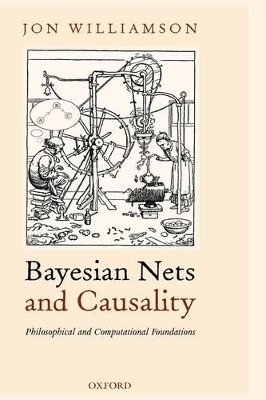
Bayesian Nets and Causality: Philosophical and Computational Foundations
Seiten
2004
Oxford University Press (Verlag)
978-0-19-853079-4 (ISBN)
Oxford University Press (Verlag)
978-0-19-853079-4 (ISBN)
Bayesian nets are used in artificial intelligence as a calculus for causal reasoning, enabling machines to make predictions, perform diagnoses, take decisions and even to discover causal relationships. This book brings together how to automate reasoning in artificial intelligence, and the nature of causality and probability in philosophy.
Bayesian nets are widely used in artificial intelligence as a calculus for causal reasoning, enabling machines to make predictions, perform diagnoses, take decisions and even to discover causal relationships. But many philosophers have criticised and ultimately rejected the central assumption on which such work is based - the Causal Markov Condition. So should Bayesian nets be abandoned? What explains their success in artificial intelligence?
This book argues that the Causal Markov Condition holds as a default rule: it often holds but may need to be repealed in the face of counterexamples. Thus Bayesian nets are the right tool to use by default but naively applying them can lead to problems. The book develops a systematic account of causal reasoning and shows how Bayesian nets can be coherently employed to automate the reasoning processes of an artificial agent.
The resulting framework for causal reasoning involves not only new algorithms but also new conceptual foundations. Probability and causality are treated as mental notions - part of an agent's belief state. Yet probability and causality are also objective - different agents with the same background knowledge ought to adopt the same or similar probabilistic and causal beliefs. This book, aimed at researchers and graduate students in computer science, mathematics and philosophy, provides a general introduction to these philosophical views as well as an exposition of the computational techniques that they motivate.
Bayesian nets are widely used in artificial intelligence as a calculus for causal reasoning, enabling machines to make predictions, perform diagnoses, take decisions and even to discover causal relationships. But many philosophers have criticised and ultimately rejected the central assumption on which such work is based - the Causal Markov Condition. So should Bayesian nets be abandoned? What explains their success in artificial intelligence?
This book argues that the Causal Markov Condition holds as a default rule: it often holds but may need to be repealed in the face of counterexamples. Thus Bayesian nets are the right tool to use by default but naively applying them can lead to problems. The book develops a systematic account of causal reasoning and shows how Bayesian nets can be coherently employed to automate the reasoning processes of an artificial agent.
The resulting framework for causal reasoning involves not only new algorithms but also new conceptual foundations. Probability and causality are treated as mental notions - part of an agent's belief state. Yet probability and causality are also objective - different agents with the same background knowledge ought to adopt the same or similar probabilistic and causal beliefs. This book, aimed at researchers and graduate students in computer science, mathematics and philosophy, provides a general introduction to these philosophical views as well as an exposition of the computational techniques that they motivate.
Jon Williamson is at the Department of Philosophy, Logic, and Scientific Method, London School of Economics, London
Introduction ; Probability ; Bayesian Nets ; Causal Nets: Foundational Problems ; Objective Bayesianism ; Two-Stage Bayesian Nets ; Causality ; Discovering Causal Relationships ; Epistemic Causality ; Recursive Causality ; Logic ; Language Change ; References ; Index
| Erscheint lt. Verlag | 23.12.2004 |
|---|---|
| Zusatzinfo | numerous figures |
| Verlagsort | Oxford |
| Sprache | englisch |
| Maße | 164 x 242 mm |
| Gewicht | 586 g |
| Themenwelt | Geisteswissenschaften ► Philosophie ► Logik |
| Informatik ► Theorie / Studium ► Künstliche Intelligenz / Robotik | |
| Mathematik / Informatik ► Mathematik | |
| ISBN-10 | 0-19-853079-X / 019853079X |
| ISBN-13 | 978-0-19-853079-4 / 9780198530794 |
| Zustand | Neuware |
| Haben Sie eine Frage zum Produkt? |
Mehr entdecken
aus dem Bereich
aus dem Bereich
Buch | Softcover (2024)
REDLINE (Verlag)
20,00 €
Eine kurze Geschichte der Informationsnetzwerke von der Steinzeit bis …
Buch | Hardcover (2024)
Penguin (Verlag)
28,00 €


